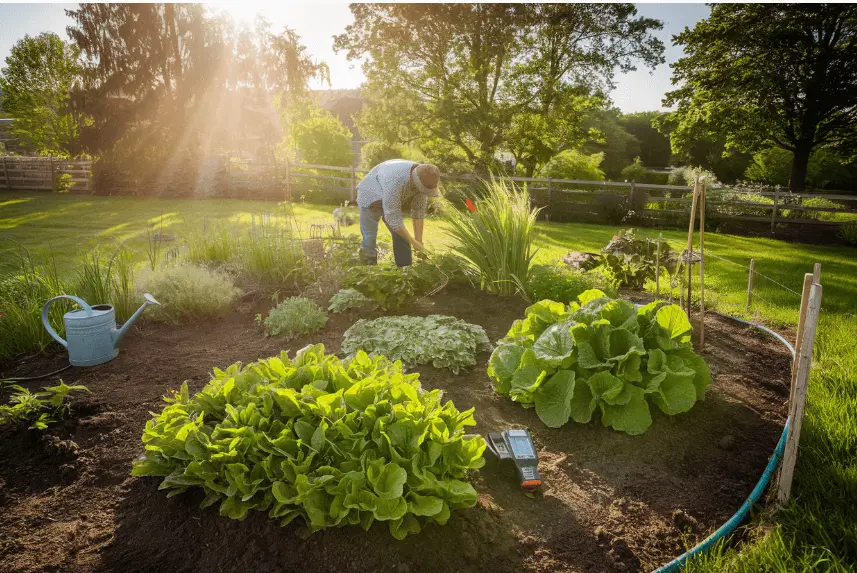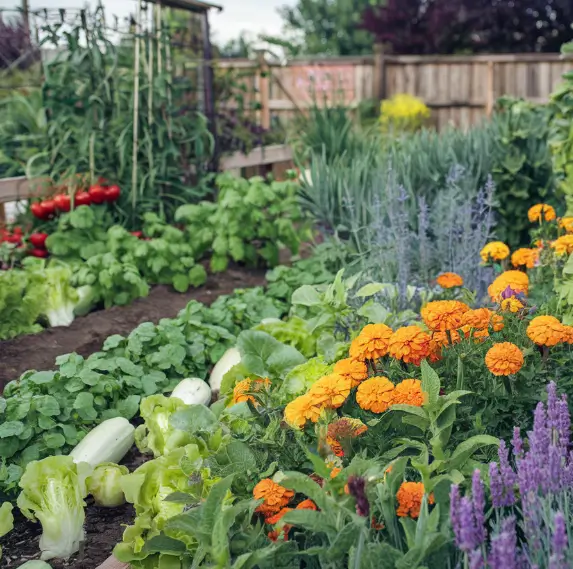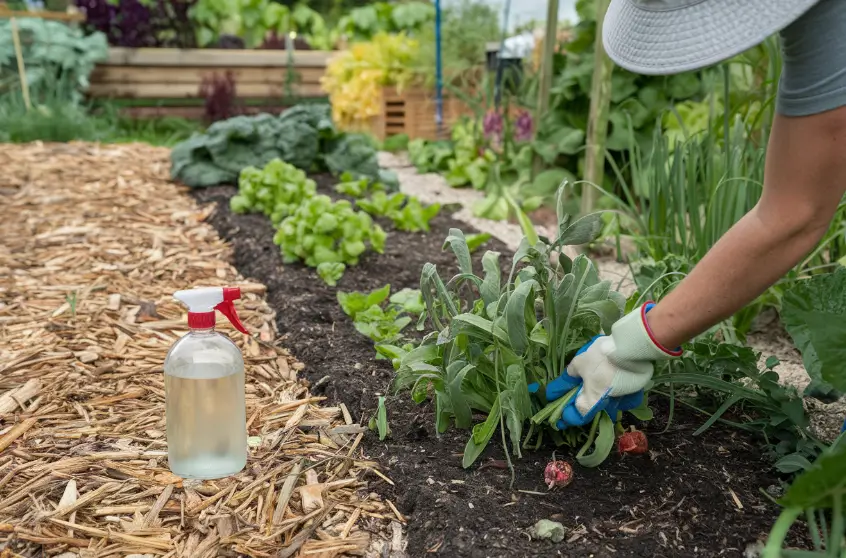A Personal Journey into Organic Gardening
I still remember the first time I saw my Mexican neighbor, Doña Maria, tending to her lush organic garden. She would wake up early every morning, humming a soft tune while carefully watering her plants. Her tomatoes were the ripest I had ever seen, her herbs fragrant, and her leafy greens vibrant. One day, curiosity got the better of me, and I asked her how she managed to grow such an abundant garden without using synthetic fertilizers or pesticides. She smiled and said, “It is all about patience, love, and working with nature, not against it.”
That conversation changed everything for me. Inspired, I decided to start my organic garden, free of chemicals and full of life. At first, I made mistakes—planting in poor soil, overwatering, and struggling with pests. But with time and research, I learned how to cultivate a thriving, sustainable garden. If you are just starting, you might feel overwhelmed, but organic gardening can be rewarding and fulfilling with the right knowledge. Here are ten essential tips to help you begin your organic gardening journey
Table of Contents
1. Choose the Right Location for Your Garden
The first and most crucial step in organic gardening is selecting the perfect spot for growing plants. Your garden’s success heavily depends on the amount of sunlight, soil quality, and water accessibility.
Consider the Following Factors:
- Sunlight: Most vegetables and herbs need at least six to eight hours of direct sunlight daily. Observe your outdoor space and identify the sunniest spot.
- Soil Quality: Test your soil for pH levels and nutrient content. Good soil is rich in organic matter and drains well while retaining adequate moisture.
- Water Accessibility: Your garden should be close to a water source to make irrigation convenient and efficient.
- Protection from Harsh Weather: Avoid areas prone to strong winds or heavy foot traffic that may damage delicate plants.
Selecting an optimal location ensures that your plants have the best conditions to flourish organically.

2. Prepare Your Soil Naturally
Healthy soil is the foundation of any successful organic garden. Without nutrient-rich, well-balanced soil, plants will struggle to grow and produce quality yields.
Steps to Improve Soil Quality:
- Conduct a Soil Test: Use a soil testing kit or send a sample to a local extension service to determine pH and nutrient levels.
- Add Organic Matter: Enrich your soil with compost, aged manure, or worm castings to improve fertility.
- Avoid Chemical Fertilizers: Synthetic fertilizers deplete soil health over time. Instead, opt for organic amendments like bone meal, fish emulsion, or green manure.
- Mulch for Moisture Retention: Apply a layer of straw, leaves, or grass clippings to retain soil moisture and suppress weeds.
By nurturing your soil naturally, you create an environment where plants can thrive without synthetic chemicals.
3. Select the Right Plants for Your Climate
Choosing plants suited to your local climate and soil conditions will increase your chances of success in organic gardening.
Best Plants for Beginners:
- Vegetables: Lettuce, tomatoes, cucumbers, radishes, and beans are easy to grow.
- Herbs: Basil, mint, cilantro, and parsley require minimal maintenance.
- Companion Plants: Marigolds, nasturtiums, and lavender help repel pests naturally.
Research the hardiness zone in your region and select varieties known to flourish in your specific environment.

4. Use Natural Fertilizers and Compost
Feeding your plants organically is essential to ensuring they receive the nutrients they need to grow robustly.
Organic Fertilizer Options:
- Homemade Compost: Kitchen scraps, coffee grounds, and yard waste create nutrient-rich compost.
- Liquid Fertilizers: Fish emulsion and seaweed extracts boost plant growth naturally.
- Cover Crops: Planting nitrogen-fixing crops like clover enhances soil health.
Avoid synthetic fertilizers that can degrade soil quality and harm beneficial microorganisms.
5. Implement Natural Pest Control Methods
One of the biggest challenges in organic gardening is managing pests without using chemical pesticides.
Effective Organic Pest Control:
- Encourage Beneficial Insects: Ladybugs, praying mantises, and bees help keep harmful pests in check.
- Use Neem Oil: This natural pesticide repels aphids, caterpillars, and whiteflies.
- Handpick Pests: Regularly inspect plants and remove pests manually.
By employing these natural methods, you can keep your garden healthy while maintaining an organic ecosystem.
6. Practice Crop Rotation and Companion Planting
Rotating crops and using companion planting techniques can help prevent soil depletion and reduce pest infestations.
Benefits of These Techniques:
- Crop Rotation Prevents nutrient depletion and soil-borne diseases.
- Companion Planting: Pairs plants that support each other’s growth, such as tomatoes with basil or carrots with onions.
- Improves Soil Health: Keeps soil structure balanced and productive.
Implementing these techniques will lead to a healthier and more resilient garden.
7. Water Wisely and Efficiently
Watering is a crucial aspect of gardening, and over- or under-watering can harm plant health.
Best Watering Practices:
- Morning Watering Reduces evaporation and prevents fungal growth.
- Drip Irrigation Delivers water directly to the roots, minimizing waste.
- Rainwater Collection: Installing rain barrels reduces reliance on tap water.
Proper watering techniques will ensure that plants receive adequate moisture while conserving resources.
8. Encourage Biodiversity in Your Garden
A diverse garden attracts beneficial insects, improves soil health, and enhances productivity.
Ways to Promote Biodiversity:
- Grow a Variety of Plants: A mix of vegetables, flowers, and herbs fosters a balanced ecosystem.
- Create habitats for Pollinators: Plant milkweed for butterflies and sunflowers for bees.
- Incorporate Perennials: Perennial plants provide long-term soil stability.
A biodiverse garden strengthens resilience and enhances overall sustainability.
9. Keep Your Garden Weed-Free Naturally
Weeds compete with crops for nutrients and space, but synthetic herbicides should be avoided.
Organic Weed Control Methods:
- Hand Pulling: Remove weeds before they spread.
- Mulching: Mulching suppresses weeds while retaining moisture.
- Vinegar Spray: A natural alternative to chemical herbicides.
Managing weeds naturally keeps your organic garden safe and productive.

10. Harvest and Store Your Produce Properly
Once your garden begins producing, it is essential to harvest correctly to maximize freshness and shelf life.
Proper Harvesting and Storage:
- Pick at Peak Ripeness: Harvest vegetables when they are fully matured.
- Store in Cool, Dry Places: Avoid spoilage by using proper storage techniques.
- Preserve Excess Produce: Canning, drying, or freezing extends shelf life.
Following these steps ensures that your hard work results in delicious, long-lasting organic produce.
Conclusion: Embrace the Journey of Organic Gardening
Starting an organic garden requires patience, dedication, and a willingness to learn from nature. Every season presents new challenges and rewards, but the satisfaction of growing chemical-free food is unparalleled. By following these ten tips, you can build a thriving organic garden and enjoy fresh, healthy produce for years to come. Happy gardening!

3 thoughts on “The 10 Tips for Starting an Organic Garden for Beginners”